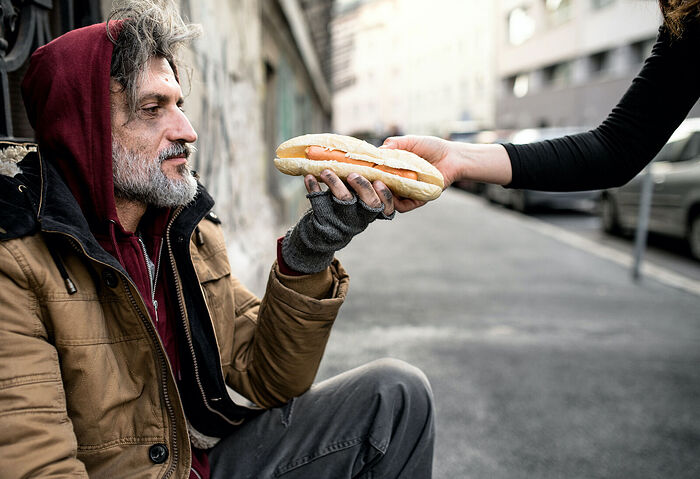So, here I am, trotting along the sidewalk, contemplating the ups and downs of my life.
“Help, in any way you can…” A thick voice, as if descending from another galaxy, catches me unawares.
I shudder as I return back to reality, then pause for a moment and look around. I see a shabby-looking, poorly-dressed guy with a haggard face and a glassy stare, but looking sort of sober. It is apparent that having wasted his life along the rough and rocky pathways, he was now at his lowest ebb and begged in order to extend his earthly subsistence.
“Help me, for Christ’s sake,” the man’s eyes brighten up as they register someone’s presence in front of him. Next, he extends his hand holding an empty plastic cup.
“Errr, but, I… you know… I can’t help you,” I mumble, checking if there are still a few coins left in my pocket. A feeling of justifiable squeamishness arises as if out of nowhere; but I am immediately ambushed by “right-minded” thoughts: Well, it’s vodka he needs, not food! I linger in hesitation, but about ready to make a step away from him. I just simply can’t do it, and that’s it!
The guy, seeing that I’m about to hit the road, knowingly nods his head, as if reading my thoughts:
“I don’t drink. I’ve had my fill. But I do want to eat. A pie or something.”
It’s so easy to share a few crumbs off your pie of well-fed life and simply feed a hungry man!
You suddenly feel all this struggle within yourself or, rather, all those “I can’ts” fighting with “I cans.” That’s when “I can” locks horns with “I want.” Ah, hello, “I want”, where are you? It seems nothing could be simpler than this: to share a few crumbs off your pie of well-fed life and feed the hungry... But do I really want it? Sure, I can, but I have no particular desire to assist outcasts like him.
“Help me, please…” mumbles the guy, losing any hope that my “I can” will win me over.
I feel sorry for him. Suddenly, I make up my mind:
“Alright let’s go, I’ll buy you something.”
And I do buy something: a meat pie, a couple of hot dogs, and a cup of coffee. I hand it over to the guy, he looks at all this, completely dumbfounded.... and then smiles:
“Thank you! God bless you...”
And my mood dramatically improves: my “I can” agreed with “I want”!
***
The Lord sends us the afflicted so that we would want to serve them—and through this apparent and tangible help, we would want to serve Him. Christ renders His power to our “I cans,” giving us everything we need to help those in need. For He doesn’t ask us to make great sacrifices, invest a lot, or spend big on poor folks. We can give only as much as we are able, but this bit will be pleasing to Him and He will accept it. For our part, we should WANT to help our neighbors, because by doing this we cultivate love in our hearts—love for people and, of course, love for God. What can be more sublime than this?
As for saying “I can’t” when, in fact, “I can”—this is playing a double game with ourselves. By our “I don’t want to,” when it actually should be “I can,” we deal cunningly with God, Who knows our hearts and expects them to turn towards the needs of our neighbors. This turn is the most important turn of our life and everyone needs to make it; that is, anyone who wants to call himself a Christian.
At the same time, if we really cannot help or we need what we could give for our own use, the Lord will not condemn us for our refusal to give. However, I’ll repeat myself, the Lord placed two small coins—the widow’s mite—well above all the offerings of the rich. In so doing, He showed for all future ages that in His eyes, it is not the sum of money donated to the poor that matters but the disposition of your heart. We may not be able to donate a hundred dollars at once—let’s give ten, but from the heart, and the Lord will accept this offering as if we had given a hundred. He will take it in and never abandon us, giving everything we need in our life.
One of my acquaintances and her two children, who really are dependent on the benevolence and assistance of strangers, once confessed to me that anytime she has any change to spare and someone asks alms of her, she never refuses, but gives a little. She does this in spite of her own desperate need. She says she knows what it means to be in great need and she simply can’t walk past someone else’s sorrow. And the Lord, because of her benevolent heart, blesses her with good people who, in turn, are not indifferent to her and her children.
Our major goal as Christians is to always want to be merciful and kind to others. On His part, the Lord will hand over to us what we can use to show that mercy. He is a rich and generous Master, and it is pleasing to Him if we give His wealth to the needy. “I want” means “I can”! If I can, it means that I want!




